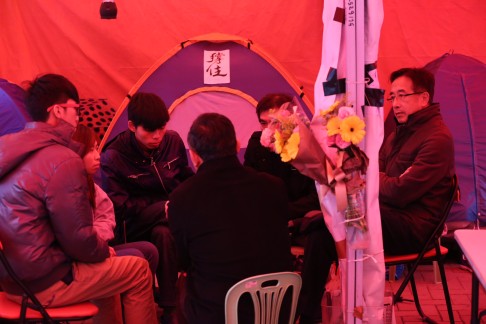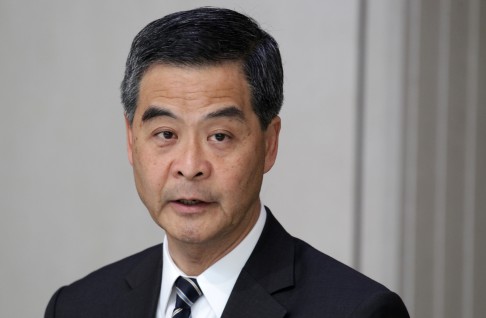
Pro-Beijing lawmakers vow to set up talks between CY Leung and student hunger strikers

Three pro-Beijing lawmakers have vowed they will try to arrange a meeting between protesters and Chief Executive Leung Chun-ying after paying a surprise visit to students on hunger strike in a bid to end the political deadlock.
In a brief conversation in Admiralty on Friday morning, the Liberal Party’s James Tien Pei-chun, together with Paul Tse Wai-chun and the Liberal Party’s new chief Chung Kwok-pan, asked the students about “people they would like to meet, the format of the dialogue and how the meeting should be dealt with”.
“But we don’t want to get too involved in the content [of the dialogue],” Tien said.
Tien said the students told him they would like to meet Leung to have “an open discussion” about rebooting political reform for the city.
Outspoken lawmaker Tien, whose Chinese People’s Political Consultative Conference membership was revoked after he suggested that Leung should consider resigning in the wake of the Occupy protests, said he planned to pass on students’ requests to chief secretary Carrie Lam Cheng Yuet-ngor.
He would then bring up the matter when the Liberal Party meets Leung next week, he pledged.

“In my opinion, [Leung] as the chief executive should pay heed to anyone or any group asking for a dialogue,” he said.
The point was for Leung to listen to students’ views, not to agree entirely to what they say, he added.
Tien pointed out to the students that the five-step political reform had begun, and hence there was no need to go back to square one. He also told students that they should meet Lam, instead, who is part of the reform trio assigned by Leung.
“But [meeting Leung] is the students’ requests. I’ll help them fight for what they want,” he said.
Scholarism convenor Joshua Wong Chi-fung said the lawmakers told him the foundation on which the talk would be based – on political reform rather than asking Beijing to withdraw its August 31 decision to screen candidates in city elections – was more “practical”.
He said he told the three lawmakers that a dialogue would be better than nothing. “They agreed,” he said.
Three Scholarism students, including Wong, started a hunger strike on Monday at 10pm, in a bid to press the government to reopen a dialogue. Two more members joined on Wednesday night.
Wong said the talk was to explore the possibility of rebooting political reform, rather than stressing the withdrawal of Beijing’s tough chief executive election framework.
This way, he said, Leung would have the authority to take action, though he insisted on not caving in to Beijing’s decision.
Wong, heading into the fifth day of his fasting, called for pro-establishment lawmakers to step in and facilitate the talks last night.
Isabella Lo Yin-wai, one of the five students on hunger strike, stopped the fast on Friday night after warnings from physicians.
Dr Wong Yam-hong, a spokesperson for the Occupy movement's medical team, said although Joshua Wong had the lowest blood sugar level of all the hunger strikers, they were most worried about Lo’s condition.
"If she goes on with her hunger strike, it is possible that her body would experience permanent damage. We strongly urged her to resume eating gradually later tonight. "
Meanwhile, in an interview with Economic Times, C. Y. Leung hinted at an imminent clearance.

“[This] can’t go on forever. As the number of occupying people at these places dwindles, we would have to take action sooner or later,” he told the Chinese-language newspaper.
He said one of the reasons for the clearance was to avoid sudden clashes that affect occupiers and students, adding that when it took place, only minimum force would be used.
But he stressed that an injunction order from courts was not needed for clearance action.
Wong agreed, but reminded Leung not to resort to “disproportionate force”.
“If [police] keep using batons to beat up protesters; smashing their heads; making them bleed; causing them to be admitted to hospital with injured eyes, suffering from broken bones and short-term memory loss, the government will have to shoulder the political responsibility,” he warned.